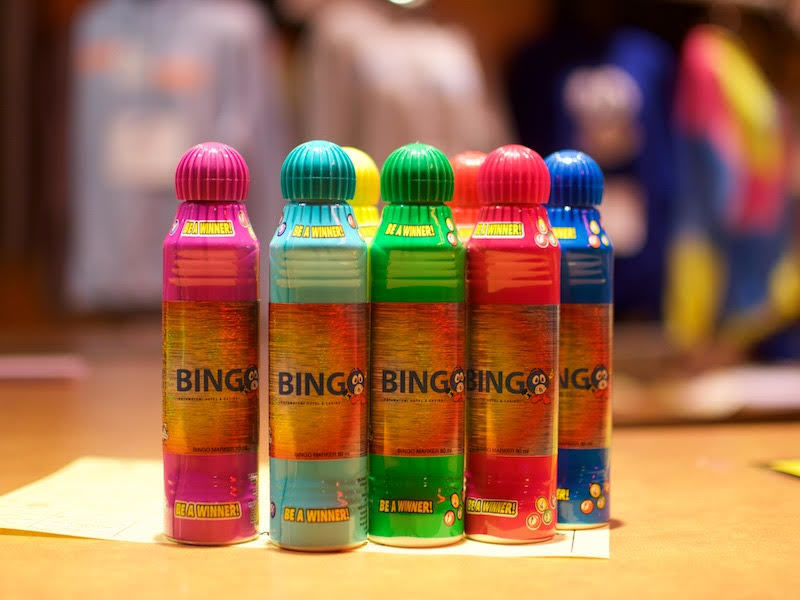Way back in the day, when I was underage and overly bored, my friends and I had limited options when it came to nightlife. In between nights guzzling java at the Coffee Trader and spending Wednesday nights at Club Marilyn, we'd occasionally mix things up with a little late-night bingo at Potawatomi Bingo Casino.
The facility was much different in the mid '90s, much less ornate and much more smoky. But bingo was cheap and easy, and a way to kill a few hours until our next half-baked plan came to fruition.
Now when I head to Potawatomi, it's usually for dinner at Dream Dance Steak or, if I feel the urge to lose money, to hit the blackjack tables. But, while I haven't played bingo in about 15 years, I still have a soft spot for it -- and I was pretty excited when Potawatomi offered me the chance to be a guest bingo caller for our Shift Switch series.
Calling bingo -- or playing bingo, for that matter -- isn't rocket science, but both require concentration. To get started, you can buy in at different levels. The weekday matinee shift that I worked, for example, begins at $10 and goes up from there. You can also rent little computers, if you're not into the daubing or paying attention thing.
Players take bingo very seriously, of course, and I was warned in advance that if I messed up a number or got too chatty on stage, I might hear some heckling from the regulars. So, for the 30 minutes preceding my shift, as I sat in the control room with the bingo manager, I started to get nervous.
Shortly before my session began, the manager led me onto the stage, facing some 600 sharply focused players. The room was just as smoky as I remembered it, although, unlike the old facilities, this hall was fully enclosed in glass so the non-smoking sections didn't get a waft of the smoke-filled air.
My job, specifically, was to call the Miracle game -- a special session in which players can spend a little extra to participate. Half of the proceeds go toward the Miracle on Canal Street charities, while the other half goes into a prize pool that is awarded in December. I was instructed to introduce myself, say a few words about the children's charity that were to benefit, and finally to wish the players good luck. I actually froze for a second, then regained my composure to welcome everyone, and the game began.
For obvious reasons, I didn't touch any equipment. What I did do was stand next to the other bingo caller -- who took a break from her normal duties during my shift -- and dutifully announced the numbers that popped up every 10 seconds.
For preparation, I had about five minutes from the time I stepped on stage to the moment I introduced myself, so I used it to study the other bingo caller. I noticed how she slowly and deliberately recited the letter and number of each ping pong ball, sounding like that polite voice on the other end of an automated phone call.
For example, when a ball came up as "G-7," she stretched out the syllables, dropping about an octave as the spoke the number called. "Gee ... sev ... en ... seven."
I figured I could do that.
My shift lasted perhaps 20 minutes, and for the first five, I focused only on saying my numbers slowly and accurately.
"Gee ... fifty ... six ... five, six ..."
Pause ... look around ... look back at the video screen fixed on the bingo balls ... wait for the computer bing to tell me to speak ...
"Eye ... twenty ... five ... two, five ..."
After a few minutes without incident, the professional bingo caller suggested I spice things up by asking the crowd if anyone was getting close. I needed to wait through a few numbers, making sure I could safely freestyle in that 10-second window without forgetting what ball to call.
"How am I doing?" I asked the crowd. Tepid applause greeted me.
One old lady in the front row flipped me the bird.
"Oh, sixty five ... six ... five ..."
Bing, chirped the computer.
"Is anyone getting close to a bingo?" I quipped. More tepid applause, but this time with a few hoots and hollers.
Now a little more comfortable with both the pacing and the impromptu chatter, I felt more relaxed. I put a little inflection into my announcements, and I even had the chance to call my favorite bingo ball: B-9.
We always giggled when that letter and number combination was called, since the guy who announced it spoke with such a heavy Wisconsin accent. So, as an inside joke to myself, I did the same way. "Bee ... nie-yen ... nieyen."
When someone stood up and shouted, "Bingo!" I had my opportunity to tell myself one more inside joke, mimicking that bingo caller of days long gone.
"Are there any other bingos?" I asked twice in my thickest Wisconsin accent. No one got the joke, and no one stood up. My job was done.
I stepped off the stage and walked out of the room. Two people in the back made a point to thank me. "You did good," said one woman. "Really good," said her friend.
I thanked her and took a deep breath. I've spoken to large groups a few times, but I've never had thousands of dollars riding on my every word. As I came down from the bingo high, I felt flushed in my face, probably a combination of adrenaline, blood pressure and second-hand smoke.
On either end of the ping pong balls, bingo is still a rush.
Andy is the president, publisher and founder of OnMilwaukee. He returned to Milwaukee in 1996 after living on the East Coast for nine years, where he wrote for The Dallas Morning News Washington Bureau and worked in the White House Office of Communications. He was also Associate Editor of The GW Hatchet, his college newspaper at The George Washington University.
Before launching OnMilwaukee.com in 1998 at age 23, he worked in public relations for two Milwaukee firms, most of the time daydreaming about starting his own publication.
Hobbies include running when he finds the time, fixing the rust on his '75 MGB, mowing the lawn at his cottage in the Northwoods, and making an annual pilgrimage to Phoenix for Brewers Spring Training.





